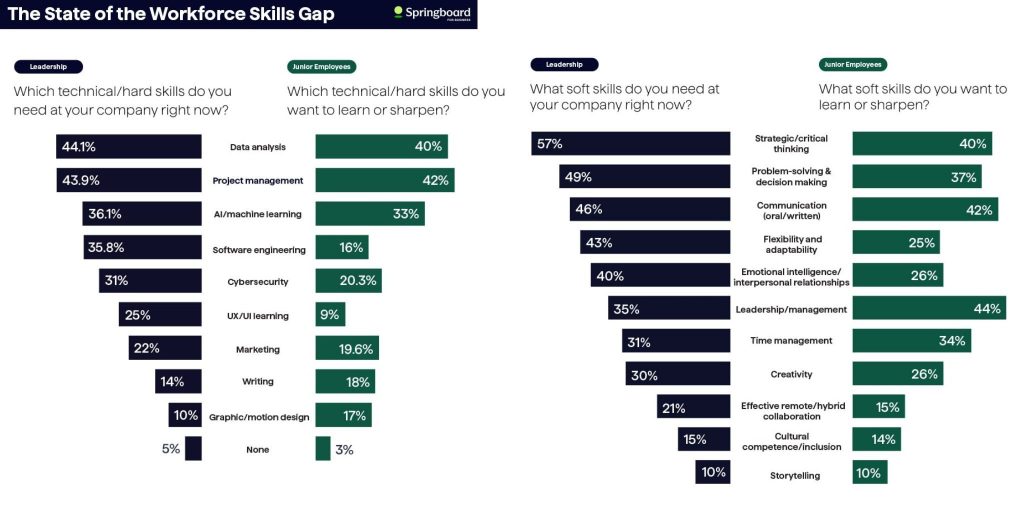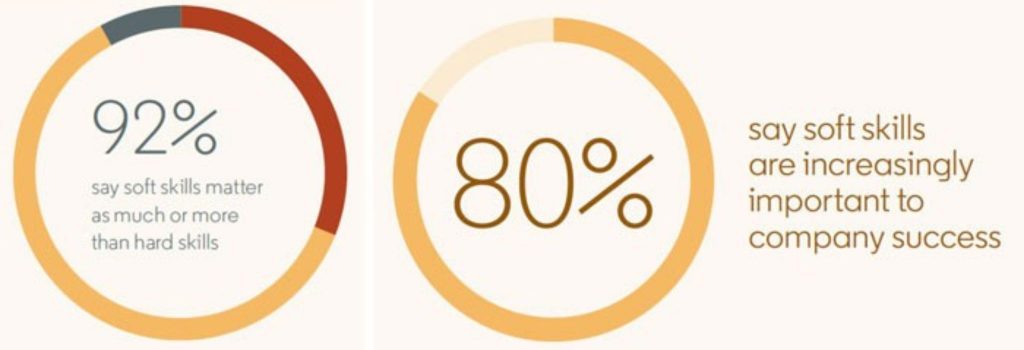
As a student, acquiring the knowledge and skills required for your chosen field early on is crucial. Not only does it allow you to graduate on time, but it also prepares you for the employment realm. It’s great that the academic world offers various opportunities for knowledge acquisition and skills development.
But as a student, what soft and hard skills should you develop?
Forbes cites essential soft skills in 2024, such as communication, leadership, and time management, as well as in-demand hard skills, such as generative AI, data, and cybersecurity. It’s best to enhance these abilities while still studying to ensure graduation and better employment.
Don’t worry; this post reveals the top skills to hone as a student. Read on to learn how to develop these key attributes and abilities.
Understanding Soft and Hard Skills
A skill is an ability acquired through training, practice, and/or experience as well as required for a certain job, task, or activity. Generally, it is classified into two types:
- Soft skills are non-technical abilities like communication, interpersonal, analytical, and leadership skills. Springboard cites the top soft skills identified by business leaders: Strategic or critical thinking (57%), problem-solving and decision-making (49%), and oral or written communication (46%).
- Hard skills are specialized abilities like content wiring, graphic designing, web development, and IT programming. Springboard also reports the in-demand technical skills that business leaders need today: data analysis (44.1%), project management (43.9%), and artificial intelligence (36.1%).

Kim Perry, Chief Growth Officer at emtelligent, believes that both hard and soft skills are needed in the workplace. She argues, “Of course, these skills may vary from one industry, company, or profession to another.”
Perry continues, “In our company, we have interest in hiring those with deep functional and technical expertise in healthcare and AI. However, we also deeply value talent with strong communication, teamwork, critical thinking, and leadership skills. These team members help promote a positive workplace culture, enhance engagement, increase productivity, and overall are critical to our organization’s success.”
What Top Skills To Hone as a Student
Both hard and soft skills are essential in the workplace. However, 70% of leaders believe there’s a skills gap in their company or organization. This gap is negatively impacting employee performance and business success.

- Communication: It’s the ability to convey your ideas clearly and effectively while understanding others as well. As a student, you can work on your oral and writing skills in school to prepare for employment. Note that effective employee communication increases productivity by 25% and ROI by 47%.
- Interpersonal relationships: It’s being able to get along and work well with internal stakeholders, whether colleagues, leaders, or third-party vendors. As a student, practice mingling with your fellow students and teachers. The goal is to establish good relationships with them, which you can carry into the workplace.
- Public relations (PR): It’s the ability to interact with external stakeholders effectively, whether with the media or the public. As a student, start networking in college by learning to engage with others and promote your advocacies on various platforms. Nearly 75% don’t think the PR definition today describes their work five years ago.
- Problem-solving: This entails figuring out and fixing issues efficiently and effectively. It’s easy to see students solve problems in various subjects, especially math. However, it’s best to learn how to employ critical thinking and come up with practical solutions.
- Emotional quotient (EQ): Harvard defines emotional intelligence as “a set of skills that help us recognize, understand, and manage our own emotions as well as recognize, understand, and influence the emotions of others.” In short, EQ is about managing your emotions and relating well to others.
- Leadership: It’s the ability to inspire, motivate, guide, and manage others. Develop leadership skills in college by joining organizations and attending leadership training programs. It’s no secret how leadership is vital to organizational success.
- Organization: This means planning tasks well and keeping things in order. What better way to acquire this skill than to stay organized as a student? This can go as simple as sorting your stuff to managing complex projects like thesis. Organizational skills are crucial to business success.
- Time management: This involves organizing your time to get things done efficiently. Consider popular time management techniques like the Eisenhower Matrix, Pomodoro Technique, Eat-that-frog rule, and time blocking. It’s best to master time management as a busy student.
- Technical: This entails knowing how to execute techniques and use tools to carry out a specific task. Of course, these skills vary from one niche or industry to another. So, as a student, take your studies seriously to acquire the skills required for your future profession or chosen career.
- Digital literacy: This means comfortably using and understanding digital tools and technologies. About 70% of companies have implemented digital transformation strategies or have already worked on some. As a student, align your skills with the digital transformation needed in the workplace.

Meanwhile, Bo Cicak, Chiropractor Doctor at Neurogan Health, emphasizes the role of schools in developing hard skills. “If you’re passionate about promoting overall well-being, you might want to become a health professional. Entering med school is key to acquiring this specialized skill and working in the medical field someday.”
Still, hard and soft skills will prepare you for the world of employment. As a student, here’s how to develop them:
1. Set out self-improvement goals
As a student, start by defining your specific goals for self-improvement. These personal and professional objectives should be on your bucket list before graduation. What do you hope to become after leaving the academic world? You probably have the following goals:
- To transform into a good leader. Developing leadership skills will help you climb up the corporate ladder quickly and easily.
- To be an excellent communicator. Effective communication can take you to places, from getting hired to rising above the rank and file.
- To become a people-magnet. Interpersonal skills will help boost your employee engagement in the workplace.
- To turn into a tech-savvy person. Technical skills let you get a high-paying tech job, which is all the rage these days!
- To kick digital literacy up a notch. It offers plenty of online opportunities, like working in the gig economy!
Sergey Taver, Marketing Manager at Precision Watches, recommends listing specific student goals. “Defining your goals at the start of the school year is best. That will help you identify the skills you need to achieve them. Remember, time is ticking, just like the watches we sell. But you can accomplish much if you put your mind and heart into your goals.”
2. Participate in relevant organizations
The different classes you’ll attend will help you acquire specialized skills. They will prepare you for professional certifications and licenses and future employment thereafter. However, there are soft skills you’ll develop from pursuing extracurricular activities. That said, consider the following:
- Join student organizations. Taking responsibility will hone the skills required for the organization.
- Participate in relevant clubs. Assuming specific roles in joined clubs will help develop your soft skills.
- Engage in extracurricular activities. In addition to clubs and organizations, sports and other activities can improve your skills, such as teamwork and collaboration.
- Become a community volunteer. You can go beyond the four walls of your school and join community organizations.
- Consider joining committees. They will help develop your organizational, management, and leadership skills.
Roman Zrazhevskiy, Founder and CEO of MIRA Safety, suggests participating in extracurricular activities to develop skills. “As a student, there’s a line drawn between a book smart and a street smart. The latter is earned through social participation, where your soft skills are developed. At MIRA Safety, we hire and value employees who can engage with our target clientele more than understand our products and services.”
3. Grab learning opportunities
A school is a place for learning opportunities. What better way to succeed as a student than to take advantage of all the chances therein? However, you can also grab some opportunities outside your school and in the digital realm. That said, here are some steps to take:
- Enroll in online courses. There are a wide range of online classes you can take to develop your skills and earn certifications.
- Join training programs. It takes due diligence to find training opportunities aligning with your skills and interests.
- Participate in seminars. The school organizations and clubs you join open doorways for seminars and even webinars.
- Attend relevant workshops. You can go as far as participating in workshops with skills training and actual work.
- Take elective courses. You can also enroll in elective classes like language training in school.
Jeffrey Zhou, CEO and Founder of Fig Loans, underscores the importance of learning and development. “As a student, you should be hungry for knowledge and willing to learn. To enter the finance industry, enhance your knowledge and skills. Not only should you improve your mathematical skills but also learn financial concepts like loans, credit, stocks, bonds, and even cryptocurrencies.”
4. Get as much practical experience
It’s challenging to transition from college to work life amid passing and graduating. To ease these potential challenges, get as much relevant experience as possible while still a student. How do you go about doing so? Here are some:
- Land an internship. Some college courses require you to get internships as part of the curriculum.
- Get a part-time job. If possible, consider applying for part-time jobs that expose you to the real world.
- Take freelance work. Fret not, as the Internet is a goldmine of freelance jobs, like content writing, graphic designing, and video editing.
- Participate in group projects. It’s best to be proactive in your school projects to feel as if you’re already working.
- Join community service. As cited, you can engage in the community, whether through charity work, medical missions, or community services.
Alan Parkes, Owner of Denver Roofing & Colorado Springs Roofing, believes early business exposure is key to skills development. “ We have a handful of contractors who have already ventured into the construction industry while they were still students. Sure, focusing on your studies is key to academic success. However, getting exposed to the business world sets you up for employment success.”
5. Use online tools and resources
Technology is a game-changer not only in business but also in education. Think of the rise of artificial intelligence (AI), where 80% of leaders use this technology for various business strategies.

In education, online tools and resources are readily available in the market. While you can invest in some of these resources, you can access others for free. But if anything, they will help you acquire and develop the needed skills. As a student, take note of the following:
- Take advantage of online platforms. You can enroll in online courses like Coursera and edX and get instant certification.
- Capitalize on social media channels. Even social media platforms, such as LinkedIn Learning and YouTube, give access to tutorials and courses.
- Use digital tools and technologies. Harness the power of today’s technologies, such as workflow automation software, time-tracking tools, and project management platforms.
- Utilize communication platforms. As a student, take advantage of digital platforms like Zoom for team meetings, Slack for team communication, and Asana for task management.
- Scroll through digital books. You can even access ebooks, white papers, case studies, blogs, and other reading materials via the web.
Reyansh Mestry, Head of Marketing at TopSource Worldwide, highlights the power of technology in today’s digital landscape. “Gone are the days when students had to visit libraries to look for information. Today, they can simply surf the Internet, access different resources, and use various tools. With all the available tools and resources, enhancing your knowledge and developing your skills is no longer difficult.”
Final Words
Skills development is a crucial part of employment. However, many employees only hone these abilities while in the workplace. As a student, what better way to ensure successful employment than to invest in these skills early on?
That said, consider acquiring the top attributes outlined above, whether soft or hard skills. More importantly, follow our practical steps for developing these critical abilities while still in school. Not only will these help you achieve academic excellence, but these skills will give you a competitive advantage in the employment world.
Ultimately, these essential skills and key attributes will make you a great employee someday—a valuable asset in the company or organization!









